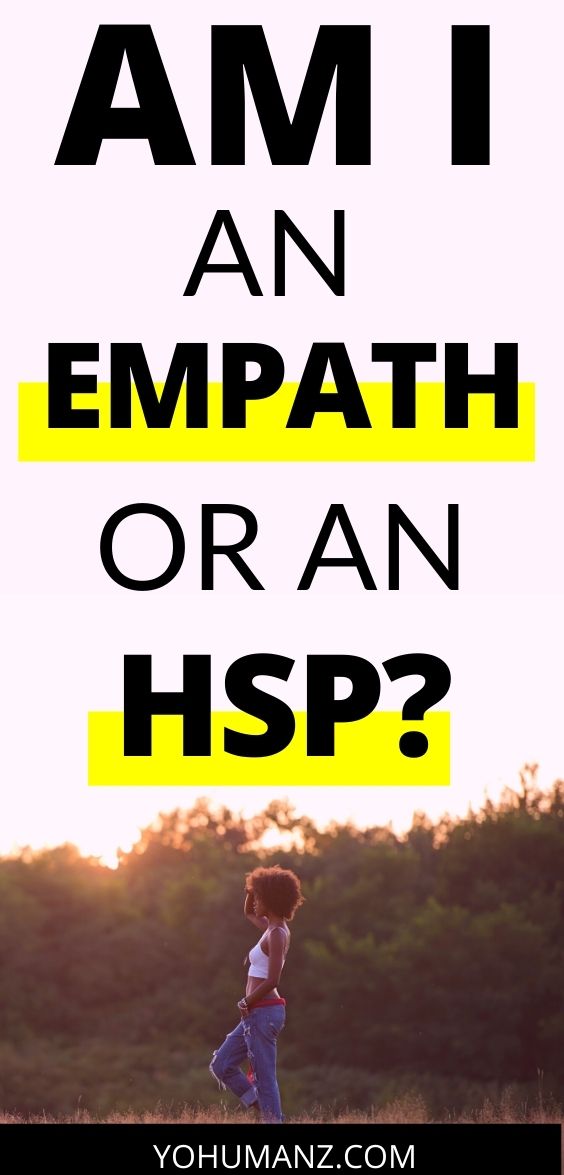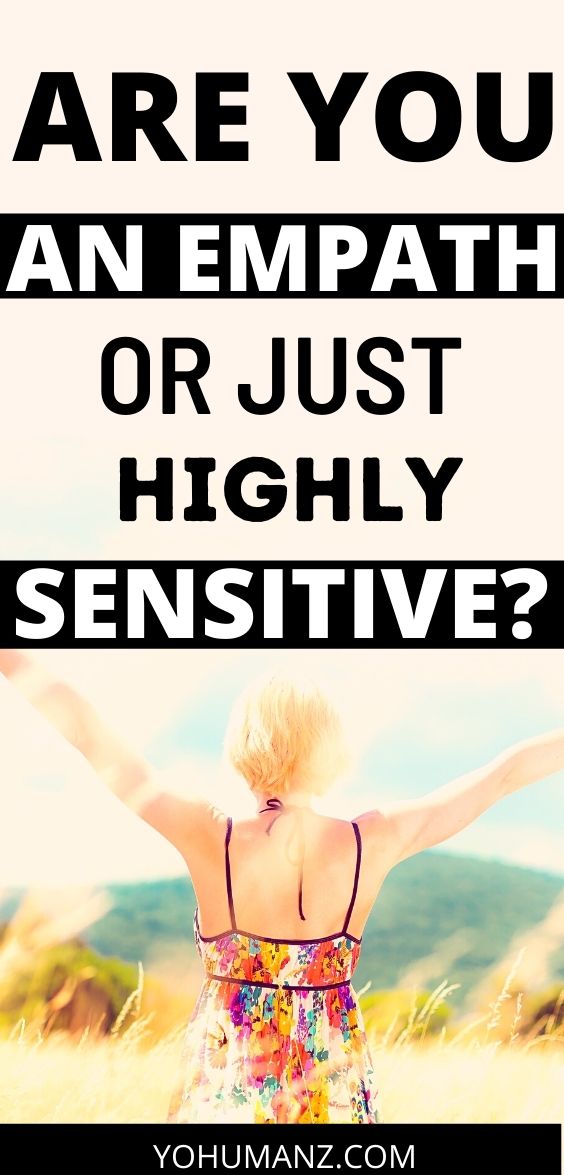Table of Contents
How can you tell if you’re an empath… or just overly sensitive?
It can be difficult to tell because both share similar traits.
So, are they the same thing then?
In this post we’re digging into what it means to be an empath and a highly sensitive person (HSP). Read on to discover if you’re either one.
What is an Empath?

An empath is someone who picks up on the emotions of others without even meaning to. This person may feel anxious suddenly and not know why. In reality, it may be caused by the nervous person they’re standing beside. If a friend tells you about a mean boss, you may go a step above compassion and literally feel the anger they’re feeling. Empaths may also feel other people’s physical problems. If a friend has a bad toothache, your teeth may begin aching and you may or may not know why.
If you’re an Empath, you may relate to:
- Strong empathy
- Understanding people/having compassion when others can’t
- Not caring is not an option
- People seem to naturally open up to you
- Strong intuition
- Dislike crowds
- Connected to nature and animals
- Intense emotions
- Easy to read others
- You need time alone or at home to recharge
- Feeling misunderstood
- Feeling like you don’t fit in
Am I An Empath or Just Sensitive?
Some people wonder, “am I an empath or just sensitive?” In the beginning, it may be difficult to tell because you can be sensitive without being an empath.
To answer whether you’re an empath or just sensitive, the main question to ask yourself is, “Am I sensitive to other people’s emotions or just my own?”
If you’re sensitive only to your own situations and emotions, you’re a sensitive person. Perhaps you may even be a highly sensitive person (more on this below). If you’re in this category, you probably feel like you feel more deeply than most people. When something happens to you, you feel the extremes of it. For example, if you breakup with someone, the change makes you more depressed than it may most people. And, when you’re in love, you feel very, very in love. Even though every emotion has a spectrum, you usually seem to rate yourself on the high end of each emotion.
However, if you’re sensitive to the emotions of OTHERS, you may be an empath. Working off the example above, an empath may also be affected by the breakup of one of their friends, feeling as though they’re going through it themselves. They may feel sad or upset for a few days. Some empaths know they’re picking up the emotions of others. Others don’t know and assume it’s their own emotion. Empaths who are aware they’re empathic do things to protect their energy so that they aren’t as affected by others.
You may also be both: Sensitive and an empath. This would mean that you’re sensitive to your own situations and those of others. So, you’d be sad about your own breakup and the breakup of a friend. You can walk into a room and “feel” the energy while also having your own strong emotions.
What is a Highly Sensitive Person (HSP)?

This term highly sensitive person (HSP) was coined by Dr. Elaine Aron who has written several books about the subject. In short, highly sensitive people feel more deeply than others. This can be in the form of emotions, but also other senses. They may have a better sense of smell, hearing and touch. For example, a noisy bar that many people love may really annoy an HSP’s ears. They may be more sensitive to pain or substances, like caffeine.
“Highly sensitive person” isn’t a medical diagnosis or disorder. It’s considered a personality trait.
If you’re an HSP, you may relate to the following:
- Other people’s mood affects you
- You’re sensitive to pain
- You have a rich/complex inner life
- You need relief from stimulation by having time alone and at home
- You’re more sensitive to loud noises
- You’re conscientious
- You’re moved by movies, art, music, etc.
- Violent movies and TV bugs you
- Change makes you feel shaken up
- You don’t like having a lot going on at once
If you think you’re an HSP, you can take the “Are You Highly Sensitive?” test.
Being an HSP has advantages:
- Empathetic
- Intuitive/good at reading others
- Creative
- Highly aware of surroundings and other people
But being highly sensitive can also have disadvantages:
- Exhaustion
- Burnout
- Overwhelm (all senses operating on high can be tough to handle)
HSPs can be extroverts, but most often they’re introverts. That’s because they’re better able to handle their sensitivity and senses at home or with a close group of people.
Can You Be Empath and an HSP?
You can be both an empath and an HSP. Actually, oftentimes, the two go hand-in-hand. Although Dr. Elaine Aron, who coined the term HSP, doesn’t speak about empaths, they have many characteristics in common.
Empaths are sensitive by nature—it’s how they pick up on other people’s emotions. That same sensitivity can also make them highly sensitive toward their own life and senses. In fact, one of the traits of being an HSP is being affected by others.
If you’re an empath, it’s likely you’re a highly sensitive person. However, if you’re a highly sensitive person, you may not necessarily be an empath. For example, as an HSP, it’s possible you’re highly aware of other’s emotions but don’t feel them yourself as an empath would.
Summary: Am I an Empath or Just Sensitive?
If you’re wondering whether you’re an empath, a highly sensitive person or both, you should ask yourself, “do I feel the emotions of other people?” If so, you are an empath. If you’re a highly sensitive person too, you’ll relate to the points we outlined above. It’s possible to either be an empath or HSP without being the other, although often the two go hand-in-hand.




